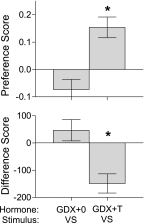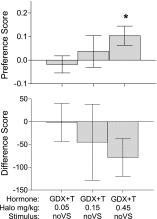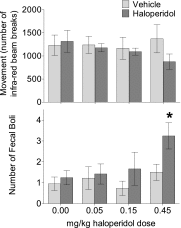Dopamine mediates testosterone-induced social reward in male Syrian hamsters
- PMID: 23372017
- PMCID: PMC3678151
- DOI: 10.1210/en.2012-2042
Dopamine mediates testosterone-induced social reward in male Syrian hamsters
Abstract
Adolescent maturation of responses to social stimuli is essential for adult-typical sociosexual behavior. Naturally occurring developmental changes in male Syrian hamster responses to a salient social cue, female hamster vaginal secretions (VS), provide a good model system for investigating neuroendocrine mechanisms of adolescent change in social reward. Sexually naïve adult, but not juvenile, males show a conditioned place preference (CPP) to VS, indicating that VS is not rewarding before puberty. In this series of experiments, the authors examined the roles of testosterone and dopamine receptor activation in mediating the adolescent gain in positive valence of VS. Experiment 1 showed that testosterone replacement is necessary for gonadectomized adult hamsters to form a CPP to VS. Experiment 2 showed that testosterone treatment is sufficient for juvenile hamsters to form a CPP to VS, and that the dopamine receptor antagonist haloperidol blocks formation of a CPP to VS in these animals. Experiments 3 and 4 demonstrated that the disruption of VS CPP with low doses of haloperidol is the result of a reduction in the attractive properties of VS and not attributable to aversive properties of haloperidol. Together, these studies demonstrate that the unconditioned rewarding properties of a social cue necessary for successful adult sociosexual interactions come about as the result of the pubertal increase in circulating testosterone in male hamsters. Furthermore, this social reward can be prevented by dopamine receptor antagonism, indicating that hypothalamic and/or mesocorticolimbic dopaminergic circuits are targets for hormonal activation of social reward.
Figures





Similar articles
-
Adolescent brain maturation is necessary for adult-typical mesocorticolimbic responses to a rewarding social cue.Dev Neurobiol. 2013 Nov;73(11):856-69. doi: 10.1002/dneu.22106. Epub 2013 Sep 20. Dev Neurobiol. 2013. PMID: 23843208 Free PMC article.
-
Maturation of social reward in adult male Syrian hamsters does not depend on organizational effects of pubertal testosterone.Horm Behav. 2012 Jul;62(2):180-5. doi: 10.1016/j.yhbeh.2012.07.002. Epub 2012 Jul 13. Horm Behav. 2012. PMID: 22796547 Free PMC article.
-
Male Syrian hamsters demonstrate a conditioned place preference for sexual behavior and female chemosensory stimuli.Horm Behav. 2010 Aug;58(3):410-4. doi: 10.1016/j.yhbeh.2010.05.017. Epub 2010 May 31. Horm Behav. 2010. PMID: 20515693 Free PMC article.
-
Stress, aggression, and puberty: neuroendocrine correlates of the development of agonistic behavior in golden hamsters.Brain Behav Evol. 2007;70(4):267-73. doi: 10.1159/000105490. Epub 2007 Sep 18. Brain Behav Evol. 2007. PMID: 17914258 Review.
-
Pubertal hormones, the adolescent brain, and the maturation of social behaviors: Lessons from the Syrian hamster.Mol Cell Endocrinol. 2006 Jul 25;254-255:120-6. doi: 10.1016/j.mce.2006.04.025. Epub 2006 Jun 5. Mol Cell Endocrinol. 2006. PMID: 16753257 Review.
Cited by
-
Adolescence and Reward: Making Sense of Neural and Behavioral Changes Amid the Chaos.J Neurosci. 2017 Nov 8;37(45):10855-10866. doi: 10.1523/JNEUROSCI.1834-17.2017. J Neurosci. 2017. PMID: 29118215 Free PMC article. Review.
-
A Positive Affective Neuroendocrinology Approach to Reward and Behavioral Dysregulation.Front Psychiatry. 2015 Jul 2;6:93. doi: 10.3389/fpsyt.2015.00093. eCollection 2015. Front Psychiatry. 2015. PMID: 26191007 Free PMC article. Review.
-
Adolescent brain maturation is necessary for adult-typical mesocorticolimbic responses to a rewarding social cue.Dev Neurobiol. 2013 Nov;73(11):856-69. doi: 10.1002/dneu.22106. Epub 2013 Sep 20. Dev Neurobiol. 2013. PMID: 23843208 Free PMC article.
-
The Teenage Brain: Social Reorientation and the Adolescent Brain-The Role of Gonadal Hormones in the Male Syrian Hamster.Curr Dir Psychol Sci. 2013 Apr 1;22(2):128-133. doi: 10.1177/0963721413479607. Curr Dir Psychol Sci. 2013. PMID: 26146466 Free PMC article.
-
Dopamine D4 receptor gene and religious affiliation correlate with dictator game altruism in males and not females: evidence for gender-sensitive gene × culture interaction.Front Neurosci. 2015 Sep 24;9:338. doi: 10.3389/fnins.2015.00338. eCollection 2015. Front Neurosci. 2015. PMID: 26441510 Free PMC article.
References
-
- Murphy MR, Schneider GE. Olfactory bulb removal eliminates mating behavior in the male golden hamster. Science. 1970;167:302–304 - PubMed
-
- Meek LR, Romeo RD, Novak CM, Sisk CL. Actions of testosterone in prepubertal and postpubertal male hamsters: dissociation of effects on reproductive behavior and brain androgen receptor immunoreactivity. Horm Behav. 1997;31:75–88 - PubMed
-
- Romeo RD, Parfitt DB, Richardson HN, Sisk CL. Pheromones elicit equivalent levels of Fos-immunoreactivity in prepubertal and adult male Syrian hamsters. Horm Behav. 1998;34:48–55 - PubMed
-
- Johnston RE, Coplin B. Development of responses to vaginal secretion and other substances in golden hamsters. Behav Neural Biol. 1979;25:473–489 - PubMed
Publication types
MeSH terms
Substances
Grants and funding
LinkOut - more resources
Full Text Sources
Other Literature Sources

